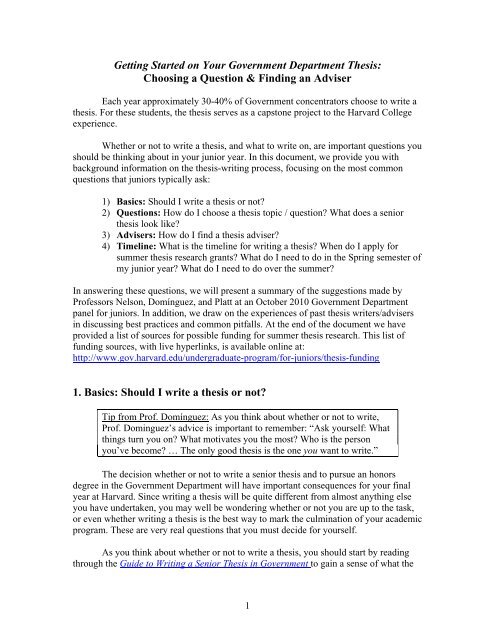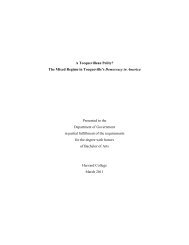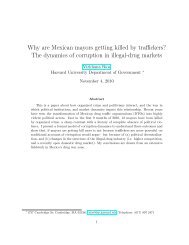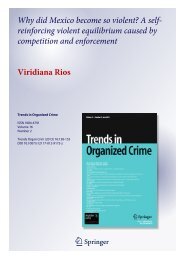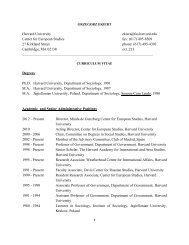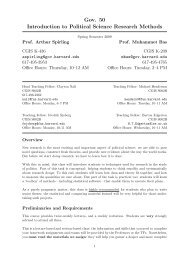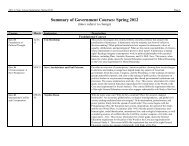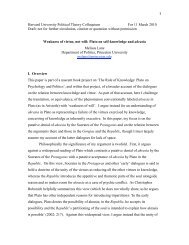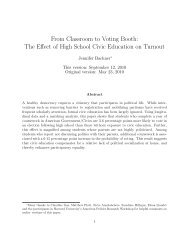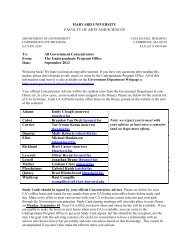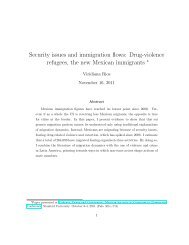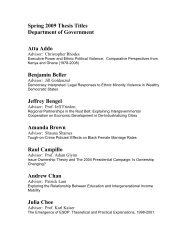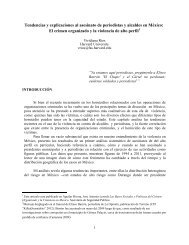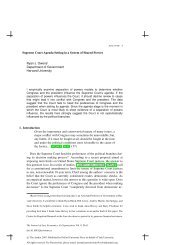Advice on Finding a Thesis Adviser - Department of Government ...
Advice on Finding a Thesis Adviser - Department of Government ...
Advice on Finding a Thesis Adviser - Department of Government ...
You also want an ePaper? Increase the reach of your titles
YUMPU automatically turns print PDFs into web optimized ePapers that Google loves.
Getting Started <strong>on</strong> Your <strong>Government</strong> <strong>Department</strong> <strong>Thesis</strong>:<br />
Choosing a Questi<strong>on</strong> & <strong>Finding</strong> an <strong>Adviser</strong><br />
Each year approximately 30-40% <strong>of</strong> <strong>Government</strong> c<strong>on</strong>centrators choose to write a<br />
thesis. For these students, the thesis serves as a capst<strong>on</strong>e project to the Harvard College<br />
experience.<br />
Whether or not to write a thesis, and what to write <strong>on</strong>, are important questi<strong>on</strong>s you<br />
should be thinking about in your junior year. In this document, we provide you with<br />
background informati<strong>on</strong> <strong>on</strong> the thesis-writing process, focusing <strong>on</strong> the most comm<strong>on</strong><br />
questi<strong>on</strong>s that juniors typically ask:<br />
1) Basics: Should I write a thesis or not?<br />
2) Questi<strong>on</strong>s: How do I choose a thesis topic / questi<strong>on</strong>? What does a senior<br />
thesis look like?<br />
3) <strong>Adviser</strong>s: How do I find a thesis adviser?<br />
4) Timeline: What is the timeline for writing a thesis? When do I apply for<br />
summer thesis research grants? What do I need to do in the Spring semester <strong>of</strong><br />
my junior year? What do I need to do over the summer?<br />
In answering these questi<strong>on</strong>s, we will present a summary <strong>of</strong> the suggesti<strong>on</strong>s made by<br />
Pr<strong>of</strong>essors Nels<strong>on</strong>, Domínguez, and Platt at an October 2010 <strong>Government</strong> <strong>Department</strong><br />
panel for juniors. In additi<strong>on</strong>, we draw <strong>on</strong> the experiences <strong>of</strong> past thesis writers/advisers<br />
in discussing best practices and comm<strong>on</strong> pitfalls. At the end <strong>of</strong> the document we have<br />
provided a list <strong>of</strong> sources for possible funding for summer thesis research. This list <strong>of</strong><br />
funding sources, with live hyperlinks, is available <strong>on</strong>line at:<br />
http://www.gov.harvard.edu/undergraduate-program/for-juniors/thesis-funding<br />
1. Basics: Should I write a thesis or not?<br />
Tip from Pr<strong>of</strong>. Domínguez: As you think about whether or not to write,<br />
Pr<strong>of</strong>. Dominguez’s advice is important to remember: “Ask yourself: What<br />
things turn you <strong>on</strong>? What motivates you the most? Who is the pers<strong>on</strong><br />
you’ve become? … The <strong>on</strong>ly good thesis is the <strong>on</strong>e you want to write.”<br />
The decisi<strong>on</strong> whether or not to write a senior thesis and to pursue an h<strong>on</strong>ors<br />
degree in the <strong>Government</strong> <strong>Department</strong> will have important c<strong>on</strong>sequences for your final<br />
year at Harvard. Since writing a thesis will be quite different from almost anything else<br />
you have undertaken, you may well be w<strong>on</strong>dering whether or not you are up to the task,<br />
or even whether writing a thesis is the best way to mark the culminati<strong>on</strong> <strong>of</strong> your academic<br />
program. These are very real questi<strong>on</strong>s that you must decide for yourself.<br />
As you think about whether or not to write a thesis, you should start by reading<br />
through the Guide to Writing a Senior <strong>Thesis</strong> in <strong>Government</strong> to gain a sense <strong>of</strong> what the<br />
1
thesis writing process involves. The Guide is <strong>on</strong>line at:<br />
http://www.gov.harvard.edu/undergraduate-program/guide-writing-thesis-gov<br />
Tip from Pr<strong>of</strong>. Platt: Writing a thesis involves asking and answering a<br />
questi<strong>on</strong> <strong>of</strong> interest to political scientists. Many theses begin as topics <strong>of</strong><br />
interest, not fully-formed questi<strong>on</strong>s, so c<strong>on</strong>sult with faculty and graduate<br />
students who can help you formulate a questi<strong>on</strong> that suits your topic.<br />
As you decide whether or not to write, you should talk with advisers, teaching<br />
fellows, and faculty about your potential thesis ideas. (See the secti<strong>on</strong>s below for more<br />
tips <strong>on</strong> how to approach faculty and teaching fellows). As you think about whether or not<br />
to write, Pr<strong>of</strong>. Domínguez’s advice is important to remember: “Ask yourself: What things<br />
turn you <strong>on</strong>? What motivates you the most? Who is the pers<strong>on</strong> you’ve become?” Is<br />
dedicating a significant porti<strong>on</strong> <strong>of</strong> your senior year to the thesis something you’re excited<br />
about doing? The senior thesis is a unique opportunity to try your hand at a serious<br />
research project, but undertaking such a project involves a serious time commitment.<br />
You’ll have a lot <strong>of</strong> other commitments senior year. Think about your<br />
applicati<strong>on</strong>s to law schools and graduate programs; your interviewing at OCS; and your<br />
leadership resp<strong>on</strong>sibilities <strong>on</strong> campus. Will you have time, or are you willing to make<br />
time, for the thesis? Writing a thesis takes up blocks <strong>of</strong> time: will you have these blocks<br />
available, or are you willing to block out time for your thesis, even if it means you might<br />
have to drop other activities or pursuits? Think too about why you want to engage in the<br />
thesis research and writing process. Is it the capst<strong>on</strong>e to your Harvard college career?<br />
Does it fit into your post-graduate plans?<br />
Tip from Pr<strong>of</strong>. Domínguez: it is misleading to talk about a senior thesis,<br />
since you will start serious work <strong>on</strong> it in the fall <strong>of</strong> your junior year. Most<br />
<strong>of</strong> your research should be d<strong>on</strong>e by the end <strong>of</strong> the summer before your<br />
senior year. If you wait to start research until your senior year, it is too<br />
late.<br />
In the spring, the <strong>Government</strong> <strong>Department</strong> will host a panel <strong>of</strong> <strong>Government</strong><br />
c<strong>on</strong>centrators (both thesis writers and n<strong>on</strong>-thesis writers) who will talk about their<br />
decisi<strong>on</strong> to write. If you are still unsure about whether or not to write, attending this panel<br />
serves as an opportunity to discuss your plans.<br />
2. Questi<strong>on</strong>s: How do I choose a thesis topic / questi<strong>on</strong>? What does a<br />
senior thesis look like?<br />
The most important part <strong>of</strong> the thesis process is coming up with the “right”<br />
questi<strong>on</strong>. You have much leeway in finding the right questi<strong>on</strong>, but it should be (1)<br />
something you really want to know about (a point emphasized by Pr<strong>of</strong>essor Dominguez),<br />
(2) answerable, and (3) in accord with scholarly principles in political science (a point<br />
Pr<strong>of</strong>essor Platt tried to reinforce). Because political science includes many diverse types<br />
<strong>of</strong> scholarship, your questi<strong>on</strong> will look quite different depending <strong>on</strong> whether you’re<br />
2
writing a political theory thesis or a thesis in <strong>on</strong>e <strong>of</strong> the other three subfields (IR,<br />
Comparative, and American).<br />
For a thesis in a n<strong>on</strong>-theory subfield, you are encouraged to develop a positive (as<br />
opposed to normative) questi<strong>on</strong> that steers away from policy analysis and normatively<br />
advocating for policy outcomes. (For more discussi<strong>on</strong> <strong>of</strong> this distincti<strong>on</strong>, see pages 3-6 <strong>of</strong><br />
the Guide for <strong>Thesis</strong> Writers).<br />
A n<strong>on</strong>-theory thesis can be broken down into these comp<strong>on</strong>ents:<br />
• Start with the puzzle/questi<strong>on</strong><br />
• Follow with a brief literature review<br />
• State your argument<br />
• Present a quantitative analysis <strong>of</strong> the data and/or<br />
• Present a qualitative analysis <strong>of</strong> the data (such as case studies)<br />
• Present your c<strong>on</strong>clusi<strong>on</strong>s<br />
Critically, you must also have some prospect <strong>of</strong> finding an answer to your<br />
questi<strong>on</strong>. In order to have an answerable questi<strong>on</strong>, you must ensure that (a) your questi<strong>on</strong><br />
is narrow enough, and (b) there is enough informati<strong>on</strong> to answer it. Thus, even at the<br />
early stages <strong>of</strong> questi<strong>on</strong> formati<strong>on</strong> you have to think prospectively about your evidence –<br />
how might you go about answering the questi<strong>on</strong>? If you can’t think <strong>of</strong> any way to gather<br />
evidence relevant to answering the questi<strong>on</strong>, it’s probably a smart idea to reformulate the<br />
query. It’s not a good idea to ask a thesis questi<strong>on</strong> about something that hasn’t happened<br />
yet (because you w<strong>on</strong>’t have enough evidence to provide an answer), nor about<br />
something that is extremely obvious.<br />
Tip from Pr<strong>of</strong>. Platt: “If you are planning to write a thesis that employs<br />
quantitative data, you will need to both ask a narrow questi<strong>on</strong> and find or<br />
generate a str<strong>on</strong>g data set."<br />
As you think about your thesis questi<strong>on</strong>, it is very important to think about the<br />
type <strong>of</strong> pers<strong>on</strong> you are, and what you want to spend your time doing. Pr<strong>of</strong>. Domínguez<br />
provides a useful 2x2 typology, and encourages you to identify in which quadrant you fit.<br />
All theses can be thought <strong>of</strong> as being <strong>of</strong> <strong>on</strong>e <strong>of</strong> four types, based <strong>on</strong> whether (a) you want<br />
to do your research indoors (e.g. inside a library with your laptop) or (b) outdoors (e.g.<br />
c<strong>on</strong>ducting interviews in the field); and whether (c) you want to stay “here” (e.g. in<br />
Cambridge or at home) or go “there” (e.g. a foreign country or a different state). The four<br />
choices are presented in Table 1.<br />
3
Table 1. What type <strong>of</strong> thesis research do you want to do?<br />
Here<br />
(in Cambridge, or at<br />
home with your laptop)<br />
There<br />
(in the field)<br />
Indoors<br />
I. Stay here and work<br />
indoors. E.g. Read books at<br />
your desk, be in Widener,<br />
stay in fr<strong>on</strong>t <strong>of</strong> your laptop<br />
and crunch numbers<br />
III. Go there and work<br />
indoors. E.g. Utilize foreign<br />
archives, or papers that are<br />
kept elsewhere<br />
Outdoors<br />
II. Stay here and work<br />
outdoors. E.g. Stay in the<br />
area and talk with people,<br />
observe people, run surveys<br />
or focus groups<br />
IV. Go there and work<br />
outdoors. E.g. Going to a<br />
foreign country or DC to talk<br />
with people, observe people,<br />
run surveys or focus groups<br />
All four types <strong>of</strong> research can lead to excellent pieces <strong>of</strong> scholarship, and the<br />
differences between them do not reflect differences in intellectual rigor, but rather in your<br />
pers<strong>on</strong>al preferences for research envir<strong>on</strong>ment. What type <strong>of</strong> pers<strong>on</strong> you are, and what<br />
you care about will determine what sort <strong>of</strong> research you’d like to pursue. Remember Pr<strong>of</strong>.<br />
Domínguez’s advice that “the <strong>on</strong>ly good senior thesis is the <strong>on</strong>e you want to write.”<br />
Political Theory Theses. In c<strong>on</strong>trast to IR, Comparative, and American theses,<br />
<strong>Government</strong> c<strong>on</strong>centrators who write political theory theses do <strong>of</strong>ten tackle normative<br />
questi<strong>on</strong>s. Pr<strong>of</strong>. Nels<strong>on</strong> points out that there is an enormous array <strong>of</strong> possible political<br />
theory thesis topics you might write <strong>on</strong>. Given these many possibilities, <strong>on</strong>e questi<strong>on</strong> you<br />
may have is: What does a political theory thesis look like?<br />
Political theory thesis questi<strong>on</strong>s can be roughly categorized into three types:<br />
1) Purely historical, e.g. Locke’s theory <strong>of</strong> slavery has <strong>of</strong>ten seemed difficult to<br />
square with the rest <strong>of</strong> his political theory. Can a c<strong>on</strong>siderati<strong>on</strong> <strong>of</strong> 17 th -century<br />
understandings <strong>of</strong> slavery and <strong>of</strong> Locke’s participati<strong>on</strong> in these debates shed light<br />
<strong>on</strong> this interpretive puzzle? Or, commentators disagree <strong>on</strong> the substance <strong>of</strong><br />
Hobbes’s theory <strong>of</strong> justice; what is the proper way to understand what Hobbes<br />
means by it?<br />
2) Partly historical/partly normative, e.g. can an explicati<strong>on</strong> <strong>of</strong> the role <strong>of</strong><br />
corporati<strong>on</strong>s in early modern thought shed light <strong>on</strong> current debates about the<br />
corporati<strong>on</strong>s, globalizati<strong>on</strong>, and governance.<br />
3) Purely normative, e.g. should justice be thought <strong>of</strong> as a characteristic <strong>of</strong><br />
instituti<strong>on</strong>s, as John Rawls urges us to believe?<br />
Pr<strong>of</strong>essor Nels<strong>on</strong> also notes that it is wr<strong>on</strong>g to think <strong>of</strong> political theory theses as an<br />
“empirics free z<strong>on</strong>e.” For example, topic number <strong>on</strong>e above might involve a fair amount<br />
<strong>of</strong> research into the instituti<strong>on</strong> <strong>of</strong> slavery in the 17 th century; topic two might require<br />
research into issue <strong>of</strong> c<strong>on</strong>temporary corporate governance; topic three might very well<br />
4
lead to a c<strong>on</strong>siderati<strong>on</strong> <strong>of</strong> whether a view <strong>of</strong> justice such as that <strong>of</strong> Rawls is practicable,<br />
or which set <strong>of</strong> policies/instituti<strong>on</strong>s would best embody that theory.<br />
See also “A Note <strong>on</strong> Normative Questi<strong>on</strong>s and Political Theory Theses” in A Guide to<br />
Writing a Senior <strong>Thesis</strong> in <strong>Government</strong> (p. 7).<br />
The best way to learn what a thesis looks like is to actually go Lam<strong>on</strong>t and Pusey<br />
libraries and read examples from previous years. For a list <strong>of</strong> <strong>Government</strong> theses from the<br />
last few years, see http://www.gov.harvard.edu/undergraduate-program/forseniors/finding-a-thesis-adviser.<br />
In additi<strong>on</strong>, your work in Junior Research Seminars will<br />
expose you to the type <strong>of</strong> writing that will be required <strong>of</strong> a theory thesis writer.<br />
3. <strong>Adviser</strong>s: How do I find a thesis adviser?<br />
Background. Before discussing the adviser search, it is useful to lay out the<br />
structure <strong>of</strong> thesis advising in the <strong>Department</strong>. You will have <strong>on</strong>e <strong>of</strong>ficial thesis adviser,<br />
who should be either a faculty member or a teaching fellow in the <strong>Government</strong><br />
<strong>Department</strong>. In some special circumstances, you may find an adviser outside the<br />
<strong>Department</strong>, but this needs to be approved by the Director <strong>of</strong> Undergraduate Studies. You<br />
will meet with your adviser regularly throughout the academic year to discuss your<br />
progress. If you are a joint c<strong>on</strong>centrator, then you will have <strong>on</strong>e adviser in each<br />
<strong>Department</strong>, and you will need to determine a working relati<strong>on</strong>ship that is amenable to<br />
both advisers.<br />
<strong>Finding</strong> an adviser is a process that should start by the end <strong>of</strong> your Junior Fall.<br />
Over the course <strong>of</strong> your Junior Spring, you should plan <strong>on</strong> emailing, speaking, and<br />
meeting with potential advisers. By the end <strong>of</strong> Junior Spring, before you leave campus for<br />
the summer, you should turn in a <strong>Thesis</strong> <strong>Adviser</strong> C<strong>on</strong>tract to the Undergraduate Program<br />
Office. The deadline for 2011 is May 14, 2011. If you are not able to find an adviser<br />
before summer, the Undergraduate Program Office will work with you over the summer<br />
to find <strong>on</strong>e.<br />
A successful advisee/adviser relati<strong>on</strong>ship rests <strong>on</strong> regular and accurate<br />
communicati<strong>on</strong> about thesis progress. You want to find an adviser who you feel<br />
comfortable working with, and you should be clear with your adviser from the start about<br />
your visi<strong>on</strong> for the thesis, as well as your time c<strong>on</strong>straints. If, for instance, you’re going<br />
to be applying for law school and going through OCS recruiting in the Fall, it’s important<br />
that your adviser knows how much time you’ll have for your thesis work.<br />
Tip from Pr<strong>of</strong>. Domínguez: It’s easy to oversell the importance <strong>of</strong> the need for a<br />
substantive, empirical link between your adviser’s work and the work that you<br />
plan to do <strong>on</strong> your thesis. Even if your thesis is regi<strong>on</strong>ally focused, it’s not<br />
particularly important that you are advised by a regi<strong>on</strong>al specialist. You will<br />
quickly become the expert <strong>on</strong> the regi<strong>on</strong>/subregi<strong>on</strong>, and most c<strong>on</strong>versati<strong>on</strong>s with<br />
your adviser will be spent going over the details <strong>of</strong> your questi<strong>on</strong>, not the<br />
adviser’s own research.<br />
5
Step 1 to <strong>Finding</strong> an <strong>Adviser</strong>: Gather your thoughts (even if they’re really rough).<br />
In order to write a senior thesis, you’ll need a topic and a specific questi<strong>on</strong> related to that<br />
topic. How to move from a topic to a questi<strong>on</strong> is not always straightforward, and our<br />
thesis preparati<strong>on</strong> programming for Juniors in the Spring will provide you with help in<br />
formulating your questi<strong>on</strong>.<br />
But as you begin the adviser search, your goal should not be to arrive at a<br />
polished questi<strong>on</strong>, but simply to organize your thoughts in a way that is coherent enough<br />
to facilitate discussi<strong>on</strong> with potential advisers.<br />
Tip from Pr<strong>of</strong>. Platt: Be h<strong>on</strong>est with a potential adviser about the type <strong>of</strong><br />
research you want to do. Some advisers may prefer to work with students<br />
c<strong>on</strong>ducting large-N studies and employing quantitative methods, and it<br />
makes little sense to pursue an advising relati<strong>on</strong>ship with that type <strong>of</strong><br />
pers<strong>on</strong> if you are doing extensive fieldwork <strong>on</strong> a single case.<br />
Step 2 to <strong>Finding</strong> an <strong>Adviser</strong>: Summarize your ideas in a c<strong>on</strong>cise paragraph. In<br />
about a paragraph (maybe two if necessary) put your initial ideas down <strong>on</strong> paper. This<br />
paragraph is meant to give potential advisers a ballpark idea about your ideas and<br />
interests. It does not have to be well developed. Pr<strong>of</strong>. Domínguez suggests that you think<br />
<strong>of</strong> this as a c<strong>on</strong>versati<strong>on</strong> with faculty members and teaching fellows. They are going to<br />
ask you questi<strong>on</strong>s, and as you answer their questi<strong>on</strong>s your ideas will sharpen. It’s<br />
important to start these c<strong>on</strong>versati<strong>on</strong>s earlier rather than later so that you have time to<br />
develop your ideas.<br />
Step 3 to <strong>Finding</strong> an <strong>Adviser</strong>: Start talking with people you know in the<br />
department. Once you have a rough sketch <strong>of</strong> your ideas <strong>on</strong> paper, you should start<br />
talking to people you know. Take a look at your transcript, and identify the <strong>Government</strong><br />
<strong>Department</strong> faculty members and teaching fellows that you have met. You can also talk<br />
to your House C<strong>on</strong>centrati<strong>on</strong> <strong>Adviser</strong>s, your peers, and the DUS or Gov 99 Coordinator<br />
about your ideas. Reach out to these individuals via email to see if it’s possible to get<br />
feedback <strong>on</strong> your thesis ideas.<br />
Tip from Pr<strong>of</strong>. Platt: If you are planning to apply for a Ph.D. program in<br />
political science down the road, a faculty adviser makes sense -- their<br />
letters <strong>of</strong> recommendati<strong>on</strong> could make a difference for such programs.<br />
Once you c<strong>on</strong>nect via email, schedule a face-to-face meeting. Take advantage <strong>of</strong><br />
faculty and TF <strong>of</strong>fice hours, and expect faculty/TFs to ask you about your ideas at this<br />
meeting. For instance, they may ask: Why do you want to write <strong>on</strong> this topic? What<br />
specific questi<strong>on</strong>s are you thinking about asking? These meetings also serve as a great<br />
opportunity for you to ask faculty / TFs questi<strong>on</strong>s such as: How would you suggest I<br />
6
efine my questi<strong>on</strong>? Are there scholars I should read? How might I design my research to<br />
find an answer to my questi<strong>on</strong>?<br />
You can use these c<strong>on</strong>versati<strong>on</strong>s with faculty and graduate students to help you<br />
arrive at a more precise questi<strong>on</strong>. At the end <strong>of</strong> each email or c<strong>on</strong>versati<strong>on</strong>, make sure<br />
you ask for names <strong>of</strong> other individuals in the department who might be useful for you to<br />
talk to. By doing this, you’ll create your own network <strong>of</strong> scholars to draw up<strong>on</strong> for<br />
advice.<br />
(If you d<strong>on</strong>’t have an adviser after Step 3, then …) Step 4 to <strong>Finding</strong> an <strong>Adviser</strong>:<br />
Identify more potential advisers. In additi<strong>on</strong> to faculty and teaching fellows you already<br />
know, you should branch out to others who may be potential advisers. In the <strong>Government</strong><br />
<strong>Department</strong>, advisers can be either <strong>Government</strong> <strong>Department</strong> faculty or graduate students.<br />
A list <strong>of</strong> graduate students who have expressed particular interests in advising is available<br />
here: http://www.gov.harvard.edu/undergraduate-program/potential-thesis-advisers. You<br />
can circulate your paragraph, perhaps a revised versi<strong>on</strong> after some initial c<strong>on</strong>versati<strong>on</strong>s,<br />
and c<strong>on</strong>tinue to seek feedback and advice.<br />
Tip: As you explore thesis topics and advisers, be flexible with your<br />
questi<strong>on</strong>, approach, and methodology. You may find that an adviser is<br />
willing to advise if you modify your questi<strong>on</strong> slightly, or you may find<br />
that you want to shift your focus after talking with a faculty member or<br />
teaching fellow. Junior Spring is the time to have these discussi<strong>on</strong>s, and<br />
c<strong>on</strong>sider many possible thesis questi<strong>on</strong>s. By the end <strong>of</strong> the Spring, your<br />
goal should be to arrive at a questi<strong>on</strong> that you will take with you into the<br />
summer for possible summer research.<br />
In order to learn about faculty and teaching fellows, turn to the <strong>on</strong>line links noted above.<br />
As you read through faculty and TF pr<strong>of</strong>iles, think <strong>of</strong> two different questi<strong>on</strong>s: (A) Might<br />
this pers<strong>on</strong> possibly be interested in advising my thesis as I currently c<strong>on</strong>ceive <strong>of</strong> it? and<br />
(B) Am I interested enough in what this pers<strong>on</strong> studies to rec<strong>on</strong>ceptualize my thesis (so<br />
that it would be an advising fit for them)?<br />
(If you d<strong>on</strong>’t have an adviser after Step 4, then …) Step 5 to <strong>Finding</strong> an <strong>Adviser</strong>:<br />
Look to faculty at related Harvard schools and institutes. If your c<strong>on</strong>versati<strong>on</strong>s with<br />
<strong>Government</strong> <strong>Department</strong> faculty and teaching fellows have not produced an adviser, you<br />
can branch out to other schools, institutes, and centers to see if there are possible advisers<br />
elsewhere. Harvard is a place where there are <strong>of</strong>ten visitors / affiliates / pr<strong>of</strong>essors in<br />
other places, and there is not a central repository where every<strong>on</strong>e is listed. The University<br />
is so big and disc<strong>on</strong>nected that sometimes two people may be studying the same thing,<br />
and not even know it.<br />
BUT, as you look bey<strong>on</strong>d the <strong>Government</strong> <strong>Department</strong>, you need to be careful.<br />
Since you will be writing a political science thesis, it's important (when you look at<br />
advisers from bey<strong>on</strong>d the <strong>Government</strong> <strong>Department</strong>) to make sure that they feel<br />
comfortable advising a thesis that will be evaluated by a political science audience. There<br />
7
are many great theses to write (in history, ec<strong>on</strong>omics, public policy, etc.), but those theses<br />
w<strong>on</strong>'t be viewed as favorably in the Govt. Dept. If your adviser is from outside the<br />
<strong>Department</strong>, you will have to work harder to make sure that you are able to produce a<br />
piece <strong>of</strong> political science scholarship.<br />
With that very important caveat in mind, places you can go to c<strong>on</strong>tinue your<br />
adviser search include:<br />
• Weatherhead Center for Internati<strong>on</strong>al Affairs:<br />
http://www.wcfia.harvard.edu/fields_<strong>of</strong>_interest<br />
• Harvard University Asia Center: http://www.fas.harvard.edu/~asiactr/people.htm<br />
• Harvard Center for Internati<strong>on</strong>al Development:<br />
http://www.cid.harvard.edu/cidpeople/<br />
• Kennedy School <strong>of</strong> <strong>Government</strong>: http://www.hks.harvard.edu/centersprograms/by-topic<br />
4. Timeline: What is the timeline for writing a <strong>Government</strong> thesis?<br />
Tip from Pr<strong>of</strong>. Nels<strong>on</strong>: Start thinking early! Have a questi<strong>on</strong> before the<br />
summer. Try to start writing early too. Write as you go, rather than waiting<br />
until the very end to do it all. Note that the new calendar may give you a<br />
false sense that you have lots <strong>of</strong> time in January to write the thesis. But<br />
remember that your adviser will likely not be available during those weeks<br />
and that the “break” is actually quite short. Having a rough draft <strong>of</strong> the<br />
whole before winter break would be ideal.<br />
Ask any<strong>on</strong>e in the department about the thesis writing process, and they will echo<br />
the same sentiment: start thinking about your thesis early. You will always have less time<br />
than you think, and research will always take l<strong>on</strong>ger than you think. Starting early gives<br />
you enough time to work through these inevitable delays.<br />
Pr<strong>of</strong>. Domínguez suggests that the bulk <strong>of</strong> your research be d<strong>on</strong>e before the<br />
beginning <strong>of</strong> your senior year, and should absolutely be d<strong>on</strong>e by Halloween. You should<br />
have written 20-25 pages for your adviser to review by Thanksgiving, and a complete<br />
first draft should be finished by the beginning <strong>of</strong> the spring semester in January.<br />
February should be spent <strong>on</strong> revisi<strong>on</strong>s. Remember: the thesis is due at the beginning <strong>of</strong><br />
March!<br />
Starting with the Class <strong>of</strong> 2010, Harvard College will be implementing a new<br />
academic calendar. While the new college calendar w<strong>on</strong>’t affect all aspects <strong>of</strong> the thesiswriting<br />
timeline, it will push up some <strong>of</strong> the due dates. The need to start early is even<br />
more pressing.<br />
8
Below is a m<strong>on</strong>th-by-m<strong>on</strong>th calendar <strong>of</strong> what you should be doing your Junior<br />
year to prepare for writing a <strong>Government</strong> thesis. Bring your specific questi<strong>on</strong>s to the<br />
Undergraduate Program Office and to your c<strong>on</strong>centrati<strong>on</strong> advisers!<br />
M<strong>on</strong>th<br />
Tasks<br />
Jr. Fall Semester - Plan junior year courses to include at least <strong>on</strong>e, hopefully two, Junior Research<br />
Seminars.<br />
- Think about taking Gov 50 or an equivalent statistics course this academic year, if<br />
you haven’t d<strong>on</strong>e so already.<br />
December<br />
- Begin thinking about your thesis questi<strong>on</strong><br />
- Start looking for thesis adviser<br />
January/February - C<strong>on</strong>tinue searching for thesis adviser; developing thesis questi<strong>on</strong><br />
- Attend sessi<strong>on</strong>s <strong>on</strong> summer research funding<br />
- Submit grant proposals for summer research funding<br />
- Attend a mandatory Introducti<strong>on</strong> to <strong>Thesis</strong> Writing in <strong>Government</strong> sessi<strong>on</strong>; includes<br />
intro. to the Committee <strong>on</strong> the Use <strong>of</strong> Human Subjects in Research<br />
March<br />
- C<strong>on</strong>tinue searching for thesis adviser; developing thesis questi<strong>on</strong><br />
- Attend series <strong>of</strong> <strong>Government</strong> Dept. <strong>Thesis</strong> Preparati<strong>on</strong> Seminars (dates TBA via<br />
email)<br />
April<br />
- C<strong>on</strong>tinue searching for thesis adviser; developing thesis questi<strong>on</strong><br />
- Attend series <strong>of</strong> <strong>Government</strong> Dept. <strong>Thesis</strong> Preparati<strong>on</strong> Seminars (dates TBA via<br />
email)<br />
May - <strong>Thesis</strong> c<strong>on</strong>tracts due by May 14<br />
- Develop summer research plans<br />
June – August - Engage in summer research (determine with your adviser what, if anything, you will<br />
do over the summer)<br />
- Pr<strong>of</strong>. Domínguez notes that in order to have your research completed by Halloween,<br />
you need to do a significant porti<strong>on</strong> <strong>of</strong> the research over the summer, and in order to<br />
do a significant porti<strong>on</strong> <strong>of</strong> the research over the summer, you need to have a questi<strong>on</strong><br />
in mind before you go away for the summer.<br />
- If you have found an adviser yet, c<strong>on</strong>tact the Undergraduate Program Office ASAP<br />
August<br />
- C<strong>on</strong>tinue summer research<br />
September<br />
- If not already submitted, thesis c<strong>on</strong>tracts should be submitted by Study Card Day<br />
- C<strong>on</strong>duct research!<br />
October – December - C<strong>on</strong>duct research!<br />
- Series <strong>of</strong> Gov 99 internal deadlines: Initial descripti<strong>on</strong> <strong>of</strong> questi<strong>on</strong> / methods;<br />
Prospectus; Draft <strong>of</strong> literature review; Discussi<strong>on</strong> <strong>of</strong> methods / evidence to be used<br />
- Turn in your Prospectus to adviser and Undergraduate Office by October 7<br />
- You’ll need to have ~30 pages turned in to your adviser by December 1, and this<br />
means that you need substantial porti<strong>on</strong>s <strong>of</strong> your research completed by mid-Fall.<br />
- If you are going to be focused <strong>on</strong> final exams and papers from Thanksgiving to<br />
December, you really need to have 20-25 pages completed by Thanksgiving, and in<br />
order to write those 25 pages by Thanksgiving, you need much <strong>of</strong> your research to be<br />
finished by Halloween.<br />
January Break - Anticipate that you will be working a lot <strong>on</strong> your thesis over your January break<br />
January<br />
- Write!<br />
- Pr<strong>of</strong>. Domínguez notes that you have <strong>on</strong>ly 4-5 weeks from the start <strong>of</strong> your sec<strong>on</strong>d<br />
semester to finish your thesis, so by late January, at a rock bottom minimum, you<br />
need to have at least 2/3 <strong>of</strong> your senior thesis draft finished. This will give you<br />
enough time to complete the final 1/3 <strong>of</strong> the thesis, as well as pro<strong>of</strong>read and pay<br />
attenti<strong>on</strong> to what the final product looks like.<br />
February<br />
- Write!<br />
March - <strong>Thesis</strong> is due <strong>on</strong> March 6, 2012<br />
9


